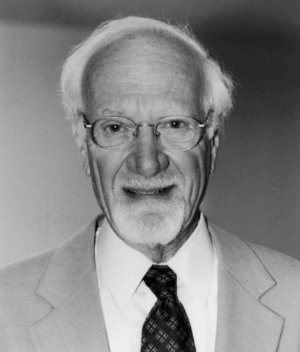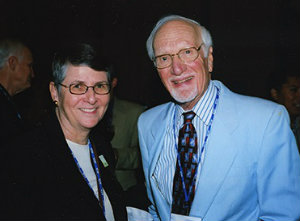 David Solomon, MD, was a pioneer of geriatric medicine.
David Solomon, MD, was a pioneer of geriatric medicine.Last week, the world lost one of the giants of American medicine and a founder of modern geriatrics, Dr. David Solomon, who passed away on July 9 at the age of 90.
“Lost,” however, is not really the right word. While I never had the honor of meeting Dr. Solomon, I can say with certainty that his legacy lives on through the people he mentored, the field he helped build, and the vision of care for older adults that continues to guide much of what we and our grantees do.
Dr. Solomon was a pioneer, initially developing one of the first centrally managed academic physician group practices as chair of the Department of Medicine at UCLA, and then, as one of the architects of the nascent field of geriatrics in the early 1980s. He developed one of the country’s first geriatric fellowship programs at UCLA and built it into the outstanding geriatrics and gerontology program that exists today. His skills as an educator and researcher garnered him so many awards and honors that, now, awards are named for him.
An endocrinologist before turning to geriatrics, Dr. Solomon understood the need for all physicians to address the unique needs of older adults. He was instrumental in building the Geriatrics for Specialists Initiative at the American Geriatrics Society , and took over its leadership upon the death of Dr. Dennis Jahnigen (another geriatrics legend and renowned teacher), before handing off, in turn, to Dr. John R. Burton of Johns Hopkins.
This initiative, funded since 1992, helps surgeons, anesthesiologists, and other related specialists provide the right kind of care to older adults. A multi-component project, the Geriatrics for Specialists Initiative has brought specialty organizations into formal partnership with the AGS. Building on Dr. Solomon’s passion for education, it has created a large cadre of specialty teachers with expertise in geriatrics through the Jahnigen Scholars program, which supports and promotes specialist junior faculty focused on geriatric care.
Dr. Solomon’s legacy will live on through these Jahnigen Scholars (88 to date). In fact, the day after he died, one of these former scholars, Dr. Tom Robinson, was featured in a Forbes article for his work to predict the risk of death and poor surgical outcomes for older patients, presented earlier in the year at the American College of Surgeons’ annual scientific meeting.
Dr. Solomon’s legacy also lives on through the fruits of the initiative’s Research Agenda Setting Process, or RASP, which helped identify and catalog open questions regarding the evidence-based care of older adults in the surgical and related medical fields. The resulting New Frontiers in Geriatrics Research publication has guided young researchers to productive careers and continues to lead to the kind of evidence breakthroughs that Dr. Robinson has found.
The leadership of Dr. Solomon also helped develop a wide variety of educational and curricular products to help future specialists take better care of their older patients .
 Dr. David Solomon, right, with Corinne Rieder, the Hartford Foundation's executive director.
Dr. David Solomon, right, with Corinne Rieder, the Hartford Foundation's executive director.My colleagues at the John A. Hartford Foundation who knew Dr. Solomon speak of him with fondness and the utmost respect as a scientist, educator, and leader. Our executive director, Corinne Rieder, described him as energetic, passionate, and incredibly dedicated to improving older adults’ health. Two years ago, Chris Langston wrote about “King” Solomon, who used his own declining health to continue teaching about the importance of the specialists initiative. I am saddened that I did not have the privilege of knowing him as they did.
I leave the final words to Dr. Burton, a long-time colleague and collaborator of Dr. Solomon. Dr. Burton offered this tribute, noting not only Dr. Solomon’s dedication to his work, but to his family—an invaluable lesson for us all:
Dr. Solomon was an indefatigable, dedicated mentor to many of the current leaders in geriatric medicine. In his kind, humble and compassionate demeanor, he personified the idealism of medicine and he stayed tightly focused through his actions, writings, talks, and comments on improving the health care of seniors. He was an exceptional visionary, wise leader, and scholar. He was an inspiring, close friend to me and was dedicated to helping me and many others be the best they could be. I will miss so greatly the wisdom and guidance he provided in our frequent conversations over the last nearly 20 years working together on the Geriatrics for Specialists Initiative.
Even with his immeasurable accomplishments in medicine, he remained totally dedicated to his wife, Ronnie, and his family. Clearly, he was inspired continually by them.
Just as we were—and will continue to be—inspired by Dr. Solomon.
